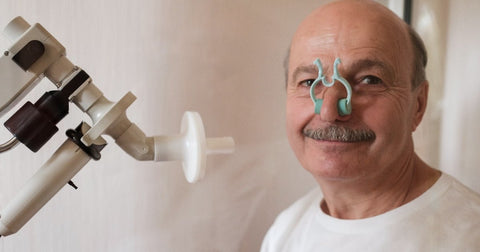Have you been struggling with persistent indigestion, heartburn, or unexplained stomach pain? It might be more than just a case of dietary indiscretion. Helicobacter pylori (H. pylori), a type of bacteria that thrives in the stomach, could be the underlying cause. Let's explore this common infection, the H. pylori breath test used to diagnose it, and how food intolerances might play a role in your digestive health.

H. Pylori: The Unwelcome Guest in Your Stomach
- Meet H. pylori: This spiral-shaped bacterium has a knack for making itself at home in your stomach lining. For many people, it causes no issues, but for others, it can lead to a range of digestive problems.
- Stomach Upset Central: H. pylori can trigger gastritis (stomach inflammation), peptic ulcers, and in rare cases, increase the risk of stomach cancer.
H. Pylori Breath Test: How It Works

This simple, non-invasive test detects H. pylori by analyzing your breath:
- Prep: Before the test, you'll be asked to fast (no food or drink) for a specific period.
- Baseline Breath Sample: You'll blow into a collection bag to establish a baseline.
- Urea Solution: You'll then drink or eat a substance containing urea, a compound that H. pylori can break down.
- Second Breath Sample: After about 15-30 minutes, you'll provide another breath sample.
- Analysis: If H. pylori is present, it will have converted the urea into carbon dioxide, which is measured in your breath.
Why Choose the H. Pylori Breath Test?
- Accurate and Reliable: This test is considered the gold standard for diagnosing H. pylori infection.
- Non-invasive: Unlike an endoscopy, it doesn't require any uncomfortable procedures.
- Convenient: The entire process typically takes less than an hour.
H. Pylori Diet: Can Food Help (or Hinder) the Healing Process?

While not a cure, certain foods can help soothe the stomach lining and potentially create an environment less hospitable to H. pylori:
- Fiber-Rich Foods: Fruits, vegetables, whole grains
- Probiotics: Yogurt, kefir, and other fermented foods
- Certain Spices: Ginger, turmeric (consult your doctor first)
How Long Does It Take for H. Pylori to Cause Cancer?
This is a complex question. While H. pylori is a risk factor for stomach cancer, it doesn't mean everyone with the infection will develop cancer. It can take years or even decades for cancer to develop, and most people with H. pylori never experience this complication.
Food Intolerances: A Potential Trigger for Stomach Issues
Beyond H. pylori, hidden food sensitivities can cause similar symptoms like bloating, gas, and abdominal pain. If your digestive problems persist even after H. pylori treatment, a premium food intolerance test can help you pinpoint triggers and optimize your diet.
When to Get Tested for H. Pylori

Talk to your doctor if you experience:
- Recurrent or persistent stomach pain
- Unexplained nausea or vomiting
- Unexplained weight loss
- Dark or tarry stools
- Family history of stomach cancer
Disclaimer: This information is intended for educational purposes only and should not be taken as medical advice. If you suspect you have an H. pylori infection or are experiencing any digestive issues, it is important to consult with a qualified healthcare professional for proper diagnosis and treatment.
Frequently Asked Questions:
1. I've been experiencing frequent indigestion. Could it be caused by H. pylori?
Yes, it's possible! H. pylori is a common cause of chronic indigestion and other digestive problems like ulcers. A breath test can help determine if it's the culprit behind your symptoms.
2. How do I know if I need to get tested for H. pylori?
Talk to your doctor if you're experiencing recurring or persistent stomach pain, nausea, vomiting, unexplained weight loss, or dark stools. They can assess your symptoms and recommend if an H. pylori breath test is necessary.
3. What should I expect during the H. pylori breath test?
The test is simple and non-invasive. You'll be asked to fast beforehand, then provide a baseline breath sample. After consuming a urea solution, you'll provide another sample, which is analyzed for increased carbon dioxide levels – a sign of H. pylori activity.
4. Is the H. pylori breath test accurate?
Yes, the breath test is considered the gold standard for diagnosing H. pylori infection. It's more accurate and less invasive than other methods like blood tests or endoscopy.
5. What if my H. pylori breath test comes back positive?
A positive test means you have an H. pylori infection. Your doctor will likely prescribe a combination of antibiotics and other medications to eliminate the bacteria.


.png?v=1737390083)
.png?v=1737187409)


